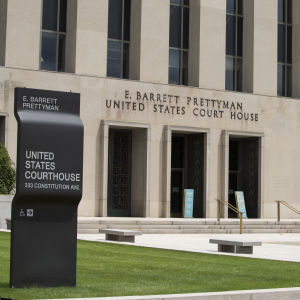After almost two years of deliberation, a highly partisan vote in February and months of observation and speculation since their implementation, the Federal Communications Commission’s strongest Internet regulations ever adopted went on trial in federal court Friday, where judges scrutinized the rules they’ll decide the legality of in the weeks to come.
“The time constraints makes definitive conclusions impossible, but the questions from the judges suggest trouble on multiple fronts and a fatal ‘third strike’ against FCC Internet regulation plans,” said Daniel Berninger, VoIP pioneer and one of the petitioners who joined the lawsuit against the FCC earlier this year.
RELATED: Net Neutrality Set for Federal Court Showdown Friday
“The oral argument in the appeal of the Open Internet Order illustrated the magnitude of legal hurdles facing Chairman Tom Wheeler’s designation as Internet referee,” Berninger said in a statement to InsideSources. “The panel of Judges Tatel, Srinivasan, and Williams heard descriptions of six separate and independent flaws in this third attempt to regulate the Internet.”
Brookings senior fellow Stuart Brotman agreed net neutrality opponents put up a more convincing courtroom fight.
“The D.C. Circuit was at the top of its game during oral argument, with an unusually expert three-judge panel,” Brotman said in a statement to InsideSources. “The FCC continued to treat this area as one based on expert policymaking. In contrast, the petitioners were far more assertive and conversant with detailed legal analysis, which is more likely to resonate with the judges when they craft the opinion.”
Friday marks the third time the D.C. Circuit Court of Appeals has heard challenges to FCC net neutrality enforcement, and could mean a third loss for the agency if Circuit Judge David Tatel, who wrote the deciding opinion in the previous two challenges shutting down the FCC, follows precedent along with Srinivasan or Williams.
RELATED: These Judges Will Decide the Fate of the Internet in December
This time the FCC sought to justify the rules, banning Internet service providers from content blocking, traffic throttling and paid prioritization, by reclassifying the Internet from an information service — exempt from much FCC regulation — to a public utility common carrier service, subject to telephone-style anti-monopoly rules.
“We’re confident the FCC’s ruling will stand up in court because the agency chose the correct legal path to protect the rights Congress gave to Internet users,” Free Press Policy Director Matt Wood said in a statement. “That path — using the agency’s Title II authority — was clearly delineated by the same U.S. Court of Appeals when it considered earlier rules that were rooted in weak legal theories.”
FCC General Counsel Jon Sallet led the agency’s defense during the marathon two hour-plus oral arguments, chiefly arguing the same authority that allowed the agency to classify broadband as an information allows it to reverse that decision, since the FCC is the default expert agency in telecommunications regulation.
“As you would expect, the judges asked some probing questions on several discrete topics, such as interconnection, paid prioritization, and mobile,” Kate Forscey, government affairs associate counsel at Public Knowledge, said Friday. “However, the carriers who are challenging the FCC’s rules ultimately have a weak case for the issues at large. The attorneys representing the FCC, intervenors, and the public interest did an excellent job explaining why the carriers’ challenge must fail and why the FCC’s action was lawful.”
“It is our belief that the court will uphold the commission’s rules, which will preserve an Open Internet free of gatekeepers,” Forscey continued. “An open Internet is essential to give consumers access to jobs, a global economy, education, healthcare and critical 21st century emergency communications in the digital age.”
Broadband industry lobbyists U.S. Telecom, National Cable & Telecommunications Association and CTIA — The Wireless Association led the suit for companies like AT&T, Verizon, Century Link and Comcast, and challenged the FCC on several legal fronts — including the 1996 Telecommunications Act’s Internet exemption from Title II, failing to give providers sufficient notice the FCC planned to fundamentally change market regulations and accusations the rules exceeded the FCC’s congressionally-mandated authority and violate ISPs’ First Amendment rights.
“By inserting itself deeply into the management of the Internet, the commission has improperly sought to expand its jurisdiction beyond the authority delegated to it by the Congress,” U.S. Telecom President Walter McCormick said in a statement Friday.
Mobile providers also made a concerted effort to exempt wireless broadband from the order, and argued the burgeoning industry is too competitive to require anti-monopoly regulations, which could slow down investment and network expansion in wireless and wired networks across the U.S.
“This regulatory overreach – which will slow innovation, chill investment, and increase cost on consumers – is completely unnecessary, given the fact that broadband providers are operating in conformance with the open Internet standards advanced by the president, support their adoption in regulation under the FCC’s Section 706 authority, and their enactment into law by the United States Congress,” McCormick said.
RELATED: FCC’s Pai on Agency’s Net Neutrality Warnings: ‘None of It Is True’
The decision pending in the coming weeks is unlikely to be the final word on the issue, according to advocates on both sides and within the FCC itself, who cite pending legislation from anti-Title II Republicans in Congress and the likelihood such a high-profile issue will end up before the Supreme Court.

